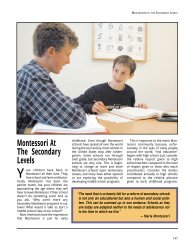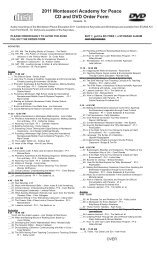Tim Seldin & Paul Epstein Ph.D. An Education for Life
Tim Seldin & Paul Epstein Ph.D. An Education for Life
Tim Seldin & Paul Epstein Ph.D. An Education for Life
Create successful ePaper yourself
Turn your PDF publications into a flip-book with our unique Google optimized e-Paper software.
spending a number of years with the<br />
students and their parents.<br />
Dr. Montessori believed that teachers<br />
should focus on the child as a person,<br />
not on the daily lesson plan.<br />
Montessori teachers lead children to<br />
ask questions, think <strong>for</strong> themselves,<br />
explore, investigate, and discover.<br />
Their ultimate objective is to help their<br />
students to learn independently and<br />
retain the curiosity, creativity, and intelligence<br />
with which they were born. As<br />
we said in an earlier chapter, Montessori<br />
teachers don’t simply present lessons;<br />
they are facilitators, mentors,<br />
coaches, and guides.<br />
Traditionally, teachers have told us<br />
that they “teach students the basic<br />
facts and skills that they will need to<br />
succeed in the world.” Studies show<br />
that in many classrooms, a substantial<br />
portion of the day is spent on discipline<br />
and classroom management.<br />
Normally, Montessori teachers will<br />
not spend much time teaching lessons<br />
to the whole class. Their primary role<br />
is to prepare and maintain the physical,<br />
intellectual, and social/emotional<br />
environment within which the children<br />
will work. A key aspect of this is<br />
the selection of intriguing and developmentally<br />
appropriate learning activities<br />
to meet the needs and interests of<br />
each child in the class.<br />
Montessori teachers usually present<br />
lessons to small groups of children at<br />
one time and limit lessons to brief and<br />
very clear presentations. The goal is to<br />
give the children just enough to capture<br />
their attention and spark their<br />
interest, intriguing them enough that<br />
they will come back on their own to<br />
work with the learning materials.<br />
Montessori teachers closely monitor<br />
their students’ progress. Because they<br />
normally work with each child <strong>for</strong> two<br />
or three years, they get to know their<br />
students’ strengths and weaknesses,<br />
interests, and personalities extremely<br />
well. Montessori teachers often use<br />
the children’s interests to enrich the<br />
curriculum and provide alternate<br />
avenues <strong>for</strong> accomplishment and success.<br />
Why Is a Montessori Classroom<br />
Called a “Children’s House?”<br />
Dr. Montessori’s focus on the “whole<br />
child” led her to develop a very different<br />
sort of school from the traditional<br />
teacher-centered classroom. To emphasize<br />
this difference, she named her<br />
first school the “Casa dei Bambini”or<br />
the “Children’s House.”<br />
The Montessori classroom is not the<br />
domain of the adults in charge; it<br />
is, instead, a carefully prepared environment<br />
designed to facilitate the<br />
development of the children’s independence<br />
and sense of personal<br />
empowerment.<br />
This is a children’s community. They<br />
move freely within it, selecting work<br />
that captures their interest. In a very<br />
real sense, even very small children are<br />
responsible <strong>for</strong> the care of their own<br />
child-sized environment. When they<br />
are hungry, they prepare their own<br />
PARENTS’ QUESTIONS &ANSWERS<br />
snacks and drinks. They go to the<br />
bathroom without assistance. When<br />
something spills, they help each other<br />
carefully clean up.<br />
Four generations of parents have<br />
been amazed to see small children in<br />
Montessori classrooms cut raw fruits<br />
and vegetables, sweep and dust, carry<br />
pitchers of water, and pour liquids with<br />
barely a drop spilled. The children normally<br />
go about their work so calmly<br />
and purposely that it is clear to even<br />
the casual observer that they are the<br />
masters in this place: The “Children’s<br />
House.”<br />
What Do Montessori Schools Mean<br />
by the Term “Normalization?”<br />
“Normalization” is a Montessori term<br />
that describes the process that takes<br />
place in Montessori classrooms around<br />
the world, in which young children,<br />
who typically have a short attention<br />
span, learn to focus their intelligence,<br />
concentrate their energies <strong>for</strong> long<br />
periods of time, and take tremendous<br />
satisfaction from their work.<br />
231




